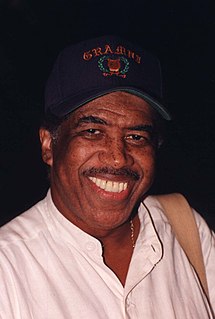A Quote by Hunter S. Thompson
One of the few ways I can almost be certain I'll understand something is by sitting down and writing about it. Because by forcing yourself to write about it and putting it down in words, you can't avoid having your say on the subject. You might be wrong, but you have to think about it very intensely to write about it.
Related Quotes
The secret to writing is writing. Lots of people I know talk about writing. They will tell me about the book they are going to write, or are thinking about writing, or may write some day in the future. And I know they will never do it. If someone is serious about writing, then they will sit down every day and put some words down on paper.
Let's say I've directed that [writing] energy into writing my latest book but suddenly, I really want to write about an onion. I don't say to myself, "No, you have stay on the subject," because I know that the longer I stay on the subject the more boring I get. So, if my mind wants to write about an onion, it might be a deeper way to go into what I'm working on, even though it might seem irrelevant. This is how I've learned to follow my mind.
During those times like in my early years as a writer I could actually write a song in ten minutes because all of a sudden a song is writing itself, I'm just putting down words. It just seem each line that you put down flows with the other ones. It's like writing a love letter you don't think about it, it's something from the heart.
I write about the power of trying, because I want to be okay with failing. I write about generosity because I battle selfishness. I write about joy because I know sorrow. I write about faith because I almost lost mine, and I know what it is to be broken and in need of redemption. I write about gratitude because I am thankful - for all of it.
I don't write about sex because it's not really my subject. I love it when other people write about it, but it's not my subject, and I don't want anyone I've had sex with to write about it. Plus, you're in front of an audience, and they picture wherever you're writing about. I'm 52; no one in the audience wants to picture that.
Many writers-in-waiting spend a lot of time avoiding the work at hand. The most common way to avoid writing is by procrastination. This is the writer's greatest enemy. There is little to say about it except that once you decide to write every day, you must make yourself sit at the desk or table for the required period whether or not you are putting down words. Make yourself take the time even if the hours seem fruitless. Ideally, after a few days or weeks of being chained to the desk, you will submit to the story that must be told.
The first several scenes are about sexual addiction. They're not specifically political at all... I didn't sit down and think, ''I am going to write something about the religious right.'' I started out by writing something about sexual addiction, and it evolved... I don't look at a calendar and say: ''Oh! There's going to be an election in 1996. I think now, in 1993, I'll start writing a play that'll be ready for it.''
































